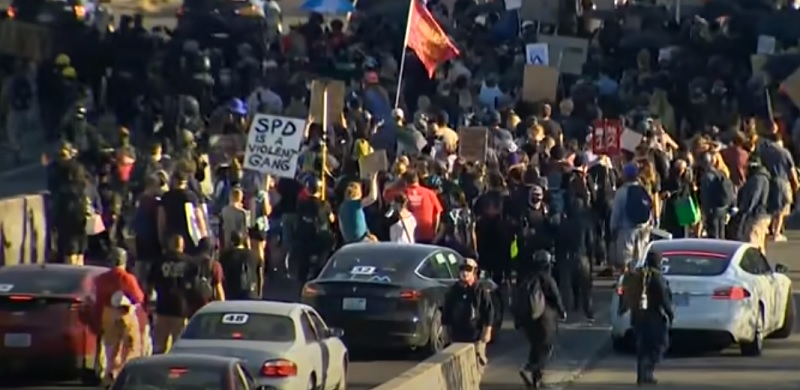
By Chief Joel F. Shults, Ed.D.
In an excellent article by NPA contributor Steve Pomper, he cites a clearly justified police shooting of an attacker who had just committed murder. Pomper related that Seattle protesters rose up against the shooting “despite non-police video showing the suspect shooting into the car the women were sitting in, police video showing the suspect shooting at arriving officers who had only seconds to react, and despite one of those women dying.”
The conclusion that, to some anti-police activists, no use of force is ever justified (since no police entity should exist) is an opinion well protected by our concept of free speech. The solution to irrational and destructive speech is to either ignore the voice with which we disagree or engage in intelligent discussion using facts and logic to engage the subject matter. The flaw in that very reasonable approach is that it rarely exists.
Agitated protestors garner headlines. Their passion inspires. Their rhetoric about racism tickles the emotions and scratches the itch of guilt. The recitation of the martyrs – even murders shot in the commission of their crime by heroic responding officers – never acknowledges the evil but appeals to the image of lost promise and grieving family left behind. Their loyalty to the “victims” of “police violence” is absent the crime scene and autopsy photos of their victims but filled with the double sadness that the killer was just about to turn their life around, had just celebrated a birthday, was going to be a good father to the babies left behind.
Not only do people listen to those voices, their headlines, and their narrative but there is very little available information to contradict their claims. The officers who had to make those dreadful decisions are forbidden to speak. Police leaders are forced to dance to the tune of conciliation. Investigations take time, and evidence will not be allowed to speak until a civil or criminal trial when the incident is likely long forgotten by the protesters and their audience. Witnesses remain silent by advice of lawyers. The tide of misinformation and disinformation rises.
What can the ordinary citizen do to filter the truth? Here are some keys:
1) Wait. It will be a long time before a use of force case is fully investigated. Even in controversial cases supposedly being watched nationally, by the time the facts become known and vetted, minds have already been made up based on the commentators and activists who are seeking attention with their speculation and accusations. Recognize that many voices have been silenced. Video and interviews have been edited. There is never just one side to the story, and hardly ever just two.
2) Listen. When news outlets, particularly those with an editorial history of activism, choose to describe an officer involved incident as a “violent killing” rather than an “in custody death under investigation” it is clear that a bias is showing. When an event is compared to other events such as “this follows a spate of brutal police killings across the country”, the careful consumer recognizes that the reporter isn’t just reporting a fire, but throwing gasoline on it to make it bigger.
3) Trust. A good citizen is skeptical and demands openness and accountability, but some level of trust in the system must remain. This trust is not merely blind faith and patriotism, but a recognition that our judicial system and law enforcement are generally trustworthy. For example, the vast majority of cases of police use of force that reach a criminal or civil trial are resolved in favor of the arresting officer. Skeptics argue that the system is rigged, that cops can’t be successfully prosecuted, and that cops will cover up misconduct by other cops.
The reality is that outside agencies cooperate to investigate complaints as thoroughly as any violent event. Officers can lose their careers and pensions by lying about other officers in a coverup. Grand juries have great power to indict officers who commit crimes. Prosecutors are accountable for objective investigations and determining charges. Multiple levels of the criminal justice system are at play and are accountable to one another. Journalists and activists watch the system carefully. Jurors are notoriously careful in their duties.
4) Seek multiple sources. Anyone can create a website with an impressive header that looks like a legitimate news source. Reading carefully, it often doesn’t take long to determine whether a writer has a bias. As a writer for NPA and founder of The National Center for Police Advocacy, my perspective should be transparent to any inquiry. My expertise allows me to back up my editorial positions with facts and logic. Others purporting to be objective journalists, or those with a stated agenda, should be able to defend their reporting as either news or editorial. Claiming to be news while holding an obvious bias is a red flag, as the American public has been learning for at least the past decade.